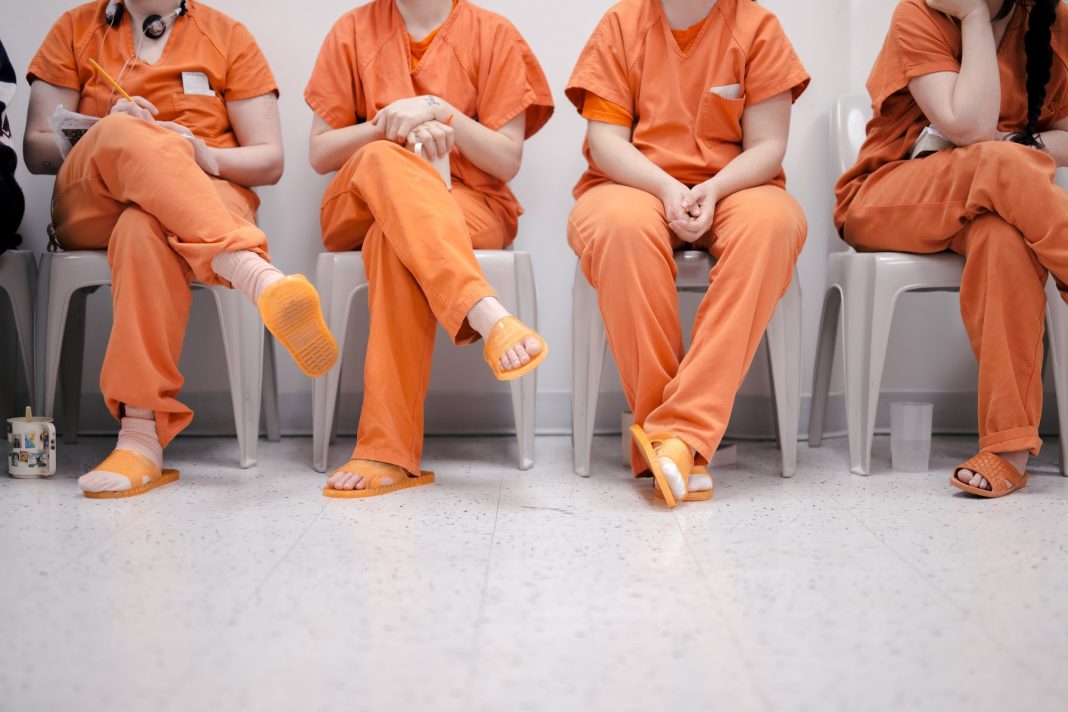In 2017, then-Gov. Mary Fallin addressed an audience in Washington about what she called Oklahoma’s “dubious honor.”
For decades, the state has led the nation in female incarceration by staggering numbers. That year, 151 per every 100,000 women in the state were in prison – many for drug-related crimes. As the incarceration rate has ballooned in recent years and more women receive lengthy sentences for nonviolent offenses, many female inmates struggle to hold on to hope.
Soon after, Stackable and Claire Collins, a Tulsa performance artist and poet, started Poetic Justice classes at the Tulsa jail.
Poetic Justice, a “restorative writing” workshop lasting 6-8 weeks, focuses as much on hope as it does on composing. Hanna Al-Jibouri, the nonprofit’s president and volunteer coordinator and once one of Stackable’s high school students, describes a typical session.
“Class time is about two hours long,” Al-Jibouri says. “Class begins with an icebreaker question. We then have students create their own ground rules for the class to follow. From there, we do a guided meditation; this allows women to relax after whatever kind of a day they may have had.
“We typically then read some exemplar poems … written by incarcerated women from previous Poetic Justice classes and discuss these together. From there, the women create a word palette, similar to a painter’s palette, where we come up with a brainstorm of potential words that may fit into our night’s poetry prompt.
women’s words
Below is a sampling of works from participants in Poetic Justice.
The Shame of Not Being Able to Read
Living in a world of darkness
with flutters of light through the cracks.
Knowledge seems to come so easy
to everyone else.
For me it’s like trying to grasp at it.
I suck at it. I can never hold on.
Like sand it slides through my fingers.
I wake up everyday
and try to pick it back up,
and form it into something tangible
that I can understand.
I feel not all the way whole.
There’s a piece of me missing.
Like a puzzle I’m trying to gather up;
all the parts are there,
I’m just struggling to connect the dots.
– V.H.
Dear Younger Me,
There will come a time in your life when you think that life isn’t fair and you want to quit. Don’t do it.
It gets better.There will be a time in your life when you think the bad people in your life won’t go away. Don’t do it.
It gets better.There comes a time in your life when you fall deeply in love, but the love of your life doesn’t feel the same. Please don’t do it.
It does get better.There comes a time in your life when you break, and you think that your life isn’t worth living. Please don’t do it.
It really does get better.There comes a time in your life when you are urged to slow down and are eventually forced to stop. Find the glue and piece yourself back together. Spend time finding yourself, and then thank God that you didn’t do it, because it did get better.
Because you got better.– M.G.
Five years ago, a University of Oklahoma graduate student doing research stumbled upon the work of OU Professor Emeritus Susan Sharp regarding the state’s system of female incarceration.
“The more I read about Oklahoma’s high rate of incarceration of women, the more I wanted to do something,” says Ellen Stackable, executive director of Poetic Justice, a nonprofit she helped to establish. “As a writing teacher, I knew the power of writing to change lives, so I started searching for a way to teach writing to incarcerated women.”
“Finally, it is time to write, and surprisingly, this only lasts about 15 minutes out of the entire class. We end class by sharing poetry.”
Al-Jibouri says sharing is optional, but most women choose to do so.
“Our chant is how we close class, repeating three times: ‘I have a voice, I have hope and I have the power to change.’”
Class exercises range from learning and writing in traditional poetic forms, such as haiku and odes, to closure letters and planning for life outside prison.
“We call these restorative writing workshops because the actual act of writing only takes up less than 25 percent of class time,” Al-Jibouri says. “We do so much to build communication skills, to restore hope, to supply them with access to senses they are deprived from.
“Our classes do so much more than just provide a space to write. We often see women coming in saying that our classroom space is the only time while in jail or prison they feel they are listened to or heard. Many other programs provide a space where they can learn new information, but they are often talked at in those classrooms rather than given a chance to create their own rules and really take pride and ownership over the space.
“The idea of choice is huge for someone in prison or jail because it is something they do not get any other time of their day.”
For her role in founding Poetic Justice, Stackable was named a CNN Hero in 2018, but she quickly points out that she is not the hero of the story.
“I felt from the beginning that the true heroes of Poetic Justice are the incarcerated women we see every week in our classes,” Stackable says. “They have the courage to dig deep into their lives, and, through writing, begin to find wholeness and begin to change.”
According to the group’s website, poeticjustice.org, more than 1,750 incarcerated women have participated in the program. Classes are held at the Tulsa County Jail, Mabel Bassett Correctional Center, Eddie Warrior Correctional Center, Turley Correctional Center and Kate Bernard Correctional Center.


























